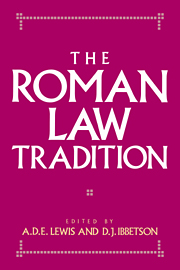Book contents
- Frontmatter
- Contents
- List of contributors
- Foreword: Peter Stein, Regius Professor of Civil Law in the University of Cambridge, 1968–1993
- List of abbreviations
- 1 The Roman law tradition
- 2 Labeo and the fraudulent slave
- 3 Doing and causing to be done
- 4 The danger of definition: contrectatio and appropriation
- 5 Going to the fair – Jacques de Révigny on possession
- 6 Bembo giureconsulto?
- 7 Gentilis and the interpretatio duplex
- 8 Ius gentium in the practice of the Court of Admiralty around 1600
- 9 Stair's title ‘Of Liberty and Servitude’
- 10 The actio communi dividundo in Roman and Scots law
- 11 Sale and transfer of title in Roman and Scots law
- 12 ‘What Marcellus says is against you’: Roman law and Common law
- 13 Audi et alteram partem: a limit to judicial activity
- Index of sources
- Index of names and subjects
5 - Going to the fair – Jacques de Révigny on possession
Published online by Cambridge University Press: 08 October 2009
- Frontmatter
- Contents
- List of contributors
- Foreword: Peter Stein, Regius Professor of Civil Law in the University of Cambridge, 1968–1993
- List of abbreviations
- 1 The Roman law tradition
- 2 Labeo and the fraudulent slave
- 3 Doing and causing to be done
- 4 The danger of definition: contrectatio and appropriation
- 5 Going to the fair – Jacques de Révigny on possession
- 6 Bembo giureconsulto?
- 7 Gentilis and the interpretatio duplex
- 8 Ius gentium in the practice of the Court of Admiralty around 1600
- 9 Stair's title ‘Of Liberty and Servitude’
- 10 The actio communi dividundo in Roman and Scots law
- 11 Sale and transfer of title in Roman and Scots law
- 12 ‘What Marcellus says is against you’: Roman law and Common law
- 13 Audi et alteram partem: a limit to judicial activity
- Index of sources
- Index of names and subjects
Summary
Having begun my studies in mediaeval Roman law under Peter Stein's supervision it seemed to me appropriate to turn to that subject in offering a tribute to him. Jacques de Révigny taught in the Orléans law school from around 1260 to around 1280, and the importance of that law school in the thirteenth and early fourteenth centuries is now well established, particularly as a result of the work of E. M. Meijers. The work which he began in the University of Leiden has been continued there under the leadership of R. Feenstra and attention has focused on the writings of Jacques de Révigny, which, so far as they had been printed before Meijers brought out their importance, had been printed under the names of others – Pierre de Belleperche in the case of his commentary on the Code and Bartolus in the case of his commentary on the Institutes. The modest addition to what has since been achieved by way of publication of his writings which follows has been made possible by association with the Leiden project. I gratefully acknowledge the help which I have received from Leiden in preparing it.
The text edited is a commentary by Jacques de Révigny on D. 41.2.6.1–7, in the mediaeval form of reference, ff de acquirenda vel amittenda possessione l.Clam possidere § Qui ad nundinas and 1. Sed et si.
- Type
- Chapter
- Information
- The Roman Law Tradition , pp. 73 - 97Publisher: Cambridge University PressPrint publication year: 1994



